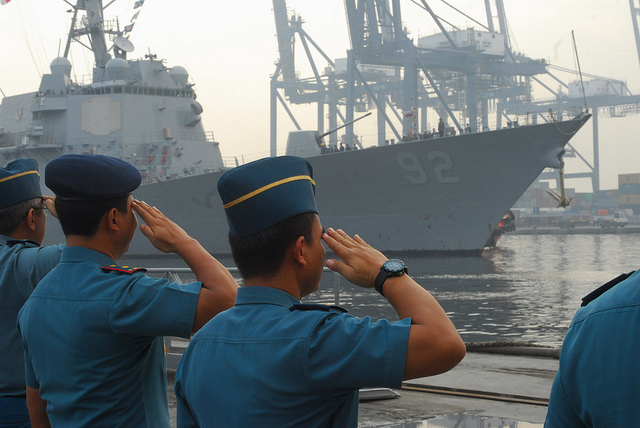With Indonesia’s presidential election scheduled for tomorrow, it’s already clear the incoming leader won’t suffer from any shortage of advice about priorities and directions. Within Indonesia, a recently-published pamphlet, ‘Memo to the President: Agenda untuk Pemerintahan Baru 2014’, written by Dr Satish Chandra Mishra, a prominent international economist, and Lieutenant General (Retired) Agus Widjojo, a renowned politico-military reformer, offers the new president a framework on how to re-energise the economy, finalise defence and security sector reform, and deal with past human-rights abuses.
According to Satish, the Indonesian economy needs politically-difficult reform to sustain and increase the rate of growth. Many of his recommendations require courage, especially his suggestion that foreign investment be allowed to break the power of ‘a few large trading families’ to stimulate the growth of the ‘missing middle’ level businesses. There are also familiar suggestions on ending fuel subsidies, fighting corruption, eliminating poverty, enlarging fiscal space to finance public infrastructure, promoting competition, creating the smart techno-savvy workforce of the future, and selling the program to the community.
Such an ambitious reform agenda would collide with the strong streak of economic nationalism that’s deeply embedded in the Indonesian psyche. True, the new president will have to address many of those issues, but the compromises he’ll have to make scarcely suggest optimum results.
In the security sector, Agus invites the new president to complete the reforms that stalled shortly after Indonesia made the transition to democracy. His prescriptions have been canvassed widely over the years but have met fierce opposition from the military, police, sections of civil society, and their allies in parliament.
He advocates passage of the long-stalled national security bill that would clarify the division of responsibilities between the military, police and others, the establishment of a National Security Council, policy subordination of the Commander-in-Chief to the minister for defence, policy subordination of the Chief of Police to a minister, creating joint military geographic commands, disbanding territorial commands below provincial level in peace time, and enabling legislation to formalise military assistance to the civil power.
He also wants a ‘blue-print’ for the long-term development of defence as a basis for force structure and defence industry policy and priorities. Although much work has been done in that area, much more is needed to create a truly joint force structure with the appropriate doctrine and support arrangements.
Agus also suggests that the military and police be allowed to vote in subsequent elections. In a strictly legal sense, they are permitted to vote in this one, but the Constitutional Court has issued a fuzzy ruling that banned their participation. That will have to be clarified before the next election. Agus has no fear that giving the police and military the right to vote will undermine their neutrality in securing the electoral process.
Not raised is the quest to bring service men and women under civil jurisdiction for civil crimes. Perhaps more fundamental reforms of the security and judicial sectors are needed before that can be done without promoting internecine conflict.
Agus wants ‘police and policing policy’ located within a ministerial portfolio or a police commission. He points to the fracturing of responsibility in having a national police force while regional governments are responsible for law and order. He suggests that police in the regions be placed under command of the governor/district chief for policy direction related to upholding public order.
To promote the ‘human security’ dimension he wants an advisory/coordinating body under the ministry of home affairs and regional governments to embrace the police and the appropriate representatives of other security-related sectors such as health, social affairs, agriculture, trade and others. Not helpful to his argument is his equation of such a body to the New Order National Coordinating Agency for National Stability (Bakorstanas).
He wants the counter-terror agency (BNPT) to become more accountable, either by placing it within a ministerial portfolio or by giving its head ex-officio ministerial status. He also sees a role for a Bakorstanas-like organisation in ‘overseeing, integrating and controlling’ the non-routine functions of the agency.
Rather than create a coast guard service, he wants to strengthen the current system by putting assets from other departments and agencies already allocated to the task under command for operations. They are currently only coordinated. That’s a sensible recommendation, but would be strongly opposed by vested interests.
Lastly, so as not to repeat the mistakes of the past and burden future generations, Agus wants an accounting for human-rights abuses. He suggests focusing on abuses committed before the Human Rights Court was established in 2000 starting with the tragedy of 1965 to promote the concept of comprehensive reconciliation that would embrace justice, truth, reparations, and institutional reform. Given that no-one has effectively been brought to account for human-rights abuses since 2000, empowering the human-rights courts should also be a priority.
Even if the Memo is read by the new president, he will have many other matters to address and political debts to honour so we will have to wait and see where these suggestions fit within his priorities.
Bob Lowry is an adjunct lecturer at the UNSW Canberra, Australian Defence Force Academy. Image courtesy of Flickr user CARAT.


